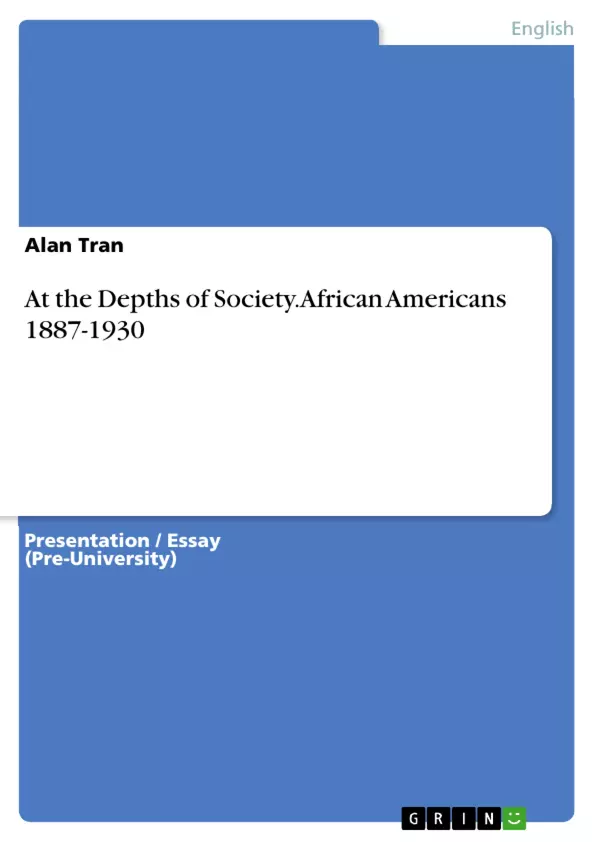Works Cited
Bundles, A’Lelia Perry. On Her Own Ground: The Life and Times of Madam C.J. Walker. New York: Washington Square, 2001. 135-36. Print
“Separate but not equal.” Smithsonian National Museum of American History. Web. 9 Oct. 2012.
<history/1-segregated/detail/jim-crow-laws.html>.
United States. Plessy v. Ferguson. Washington, D.C.:1896. Print
Wilson, August. The Piano Lesson. New York: Plume.1990.
Inhaltsverzeichnis (Table of Contents)
- At the Depths of Society
- The Sanction of Jim Crow Laws
- Economic Endeavors and Social Issues
Zielsetzung und Themenschwerpunkte (Objectives and Key Themes)
This paper aims to explore the social and economic challenges faced by African Americans in the United States from 1877 to the 1930s, despite the formal end of slavery. It examines how the persistence of racial discrimination and segregation, particularly through Jim Crow laws, significantly hindered their progress and aspirations.
- The impact of Jim Crow laws on African American life
- The struggle for economic advancement amidst racial prejudice
- The resilience and determination of African Americans in the face of adversity
- The contrast between legal equality and social reality
- The role of individual ambition and community support in overcoming obstacles
Zusammenfassung der Kapitel (Chapter Summaries)
At the Depths of Society: This introductory section sets the stage by highlighting the paradox of African American emancipation. While formally freed, they lacked the support and opportunity to truly thrive, facing systemic racism that relegated them to a position of vulnerability and second-class citizenship. The establishment of Jim Crow laws in the South further solidified this precarious situation, perpetuating segregation and discrimination despite the constitutional amendments meant to secure their rights. The chapter lays the groundwork for exploring the intertwined social and economic struggles that defined this era.
The Sanction of Jim Crow Laws: This section delves into the legal and social implications of Jim Crow laws. The Plessy v. Ferguson Supreme Court decision, which established the "separate but equal" doctrine, is examined as a pivotal moment that legalized segregation and created a loophole to circumvent the 14th Amendment's guarantee of equal protection under the law. The chapter analyzes how this legal sanction fueled further discriminatory legislation, severely restricting African Americans' freedoms and opportunities, particularly in areas of social interaction and expression. The inherently unequal nature of "separate but equal" is highlighted through examples of unequal resources and blatant disregard for the rights of African Americans.
Economic Endeavors and Social Issues: This section explores the economic aspirations of African Americans and the obstacles they encountered in achieving financial success. Using The Piano Lesson by August Wilson and the life of Madam C.J. Walker as case studies, it illustrates both the pervasive desire for upward mobility and the systemic barriers that prevented widespread economic progress. The chapter contrasts the entrepreneurial spirit and individual determination displayed by some African Americans with the broader reality of economic hardship and oppression caused by racial prejudice and systemic inequality. The discussion demonstrates how social issues significantly hampered the ability of African Americans to build lasting economic independence and stability.
Schlüsselwörter (Keywords)
Jim Crow laws, racial segregation, African American history, economic inequality, social justice, Plessy v. Ferguson, 14th Amendment, racial discrimination, Madam C.J. Walker, The Piano Lesson, August Wilson, post-Reconstruction South.
Frequently Asked Questions: A Comprehensive Language Preview
What is the main topic of this academic preview?
This preview covers the social and economic challenges faced by African Americans in the United States from 1877 to the 1930s, focusing on the impact of Jim Crow laws and persistent racial discrimination despite the formal end of slavery.
What are the key themes explored in this preview?
The key themes include the impact of Jim Crow laws on African American life, the struggle for economic advancement amidst racial prejudice, the resilience of African Americans in the face of adversity, the contrast between legal equality and social reality, and the role of individual ambition and community support in overcoming obstacles.
What specific historical events or figures are discussed?
The preview discusses the Plessy v. Ferguson Supreme Court case and its "separate but equal" doctrine, the 14th Amendment, the lives and accomplishments of Madam C.J. Walker, and the play The Piano Lesson by August Wilson as case studies illustrating both individual success and systemic barriers.
How is the preview structured?
The preview includes a table of contents, objectives and key themes, chapter summaries, and keywords. Each chapter summary provides a brief overview of its content and its contribution to the overall analysis.
What are the chapter summaries about?
At the Depths of Society: This chapter sets the historical context, highlighting the paradox of emancipation and the establishment of Jim Crow laws. The Sanction of Jim Crow Laws: This chapter examines the legal and social implications of Jim Crow laws, focusing on Plessy v. Ferguson. Economic Endeavors and Social Issues: This chapter explores the economic aspirations of African Americans and the obstacles they faced, using Madam C.J. Walker and The Piano Lesson as examples.
What are the keywords associated with this preview?
The keywords include Jim Crow laws, racial segregation, African American history, economic inequality, social justice, Plessy v. Ferguson, 14th Amendment, racial discrimination, Madam C.J. Walker, The Piano Lesson, August Wilson, and post-Reconstruction South.
What is the intended audience for this preview?
This preview is intended for academic use, aimed at researchers and students analyzing themes in African American history during the post-Reconstruction era.
What is the overall purpose of this preview?
The preview provides a comprehensive overview of the source material, allowing readers to quickly understand its scope, methodology, and key findings before engaging with the full text.
- Quote paper
- Alan Tran (Author), 2012, At the Depths of Society. African Americans 1887-1930, Munich, GRIN Verlag, https://www.grin.com/document/210859



